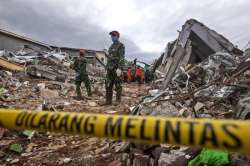Indonesian teams find more bodies, clear roads after quake
Mamuju, the provincial capital of nearly 300,000 people, was strewn with debris from collapsed buildings. The governor’s office building was almost flattened by the quake and a shopping mall reduced to a crumpled hulk. Two hospitals were damaged.

Indonesian rescuers retrieved more bodies from the rubble of homes and buildings toppled by a 6.2 magnitude earthquake, raising the death toll to 56 on Sunday, while military engineers managed to reopen ruptured roads to clear access for relief goods.
More heavy equipment reached the hardest-hit city of Mamuju and the neighboring district of Majene on Sulawesi island, where the quake hit Friday night, said Raditya Jati, the National Disaster Mitigation Agency’s spokesperson.
Power supply and phone communications also began to improve.
Thousands were left homeless and more than 800 have been injured, more than half still receiving treatment for serious injuries, Jati said. A total of 47 people died in Mamuju and nine in Majene.
Jati said at least 415 houses in Majene were damaged and about 15,000 people were moved to shelters. The agency is still collecting data from the area.
Mamuju, the provincial capital of nearly 300,000 people, was strewn with debris from collapsed buildings. The governor’s office building was almost flattened by the quake and a shopping mall reduced to a crumpled hulk. Two hospitals were damaged.
The disaster agency said the army corps of engineers cleared the road connecting Mamuju and Majene that was blocked by landslides. They also rebuilt a damaged bridge,
Many on Sulawesi island are still haunted by a magnitude 7.5 earthquake that devastated Palu city in 2018 and set off a tsunami that caused soil to collapse in a phenomenon called liquefaction. More than 4,000 people were killed, including many who were buried when whole neighborhoods were swallowed in the falling ground.
Indonesia, home to more than 260 million people, is frequently hit by earthquakes, volcanic eruptions and tsunamis because of its location on the “Ring of Fire,” an arc of volcanoes and fault lines in the Pacific Basin.
A massive magnitude 9.1 earthquake off Sumatra island in western Indonesia in December 2004 triggered a tsunami that killed 230,000 people in a dozen countries.